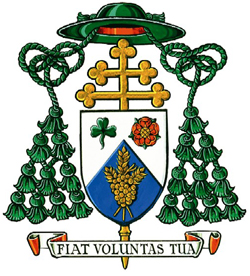Homily
[Isaiah 25:6-10a; Psalm 23; Philippians 4:12-14, 19-20; Matthew 22:1-14]
This evening I am pleased to welcome to this mass members of the Saint Luke’s Guild of physicians and healthcare workers. Its members gather with me once each year for what we call the “White Mass”, a term that derives from the outer garment often worn by doctors, nurses, and other healing professionals. We are pleased to welcome them to the Basilica for this year’s celebration.
Our liturgy offers us the occasion to offer our heartfelt thanks to these women and men, who have dedicated their lives to the healing of the sick, and see their work as not only a profession but also a calling as disciples of Jesus Christ. These days we wish also to express to them our solidarity and support. Increasingly, Catholic healthcare professionals and institutions in Canada find themselves under pressure to perform acts contrary to Church doctrine and in violation of the dictates of conscience. Members of the Saint Luke’s Guild in this Archdiocese are standing fast in fidelity to their Catholic identity and calling. To you, the members of the guild, I wish to say: I stand with you and salute you for your courageous witness.
The people we honour this evening are skilled in the art of healing physical ailments. We are grateful that we can turn to them for diagnosis and remedy. In recent days, the world has become painfully aware – yet again – of a need for healing beyond that of the mere physical, yet remains seemingly unaware of where to go for help. I speak of the disease of sin, which is manifesting itself now in horrifying symptoms. As examples, we need think only of the terrorist assault in Israel or the war perpetrated in Ukraine to appreciate just how thoroughly devastating and lethal this particular disease is. As people of faith, we proclaim that Jesus Christ is the physician we need to heal this sickness. The healing he brings goes by the name of salvation.
Among the many images used in Sacred Scripture to express the meaning of salvation is that of a banquet. We hear Isaiah speak of a rich feast hosted by God on the Lord’s mountain, where God will destroy death, wipe away tears, and take away disgrace. It is a vision of future salvation, marked by the people gathered around their saving God in unity and joy.
Jesus, the bringer of God’s salvation, picks up this theme and deepens it by speaking in a parable about a wedding banquet hosted by a king for his son. Implicit is the beautiful announcement that God does not heal from a distance; he actually wills to wed himself to his people eternally and thus heal by granting us all a share in his very life.
As we ponder this parable, I invite us to take careful note of the determination of the king. He first sends out invitations to the banquet and later notifications when the feast is ready. He is not deterred by refusals but continues to send out word and invite people into his home. The point to notice here is that the king takes the initiative and reaches out in search of people. When I am ill, it is usually I who must pick up the phone and reach out to the doctor. Only at that point will the physician know I need help, and then an appointment is made to meet at the clinic or hospital. God knows our need for salvation, our need for His healing mercy, before we do. He does not wait in His heavenly office, as it were, for us to go to Him. Rather, God acts first and, furthermore, makes house calls! He has come to the world in the gift of His Son Jesus, and by the work of the Holy Spirit continues to reach us where we are, inviting us to learn from Jesus the diagnosis of all that ails us and experience that healing remedy we call forgiveness.
That invitation from God calls for a response. Many in the parable refused the invitation from the king. How do we respond today to the call from the Lord to turn to Him for the healing that only He can give? If my doctor gives me a prescription and I do not take it; if I am told to change my diet or style of living and ignore the directives, I can hardly expect to be healed of my ailment. God’s prescription is repentance, and the lifestyle to which He directs us is that of following His Son. If we refuse the invitation from God to abandon sinful ways and find the fullness of healing in Jesus, we can anticipate not only a continuation but also a deepening of the anguish that debilitates us and our world.
That is the meaning of the reaction of the king to the man who showed up to the feast not wearing a wedding garment. He had him bound and tossed out into the darkness. In the parable, that wedding garment symbolizes a life of virtuous deeds, led in response to the experience of God’s merciful love. The message is clear: unless we respond to the Lord’s invitation to allow Jesus to heal us by his mercy and then live in accord with the remedy he prescribes, we will remain bound by sin and its terrible consequences in a very dark world.
God continues to make His house calls in the sacraments of the Church, especially here in the Eucharist, where Jesus renders himself truly present in mercy and love. He invites us anew to come to this banquet of the mass, a foretaste of the eternal heavenly feast. Let’s not refuse the invitation, now or ever, so that we might live joyfully and freely in the fullness of spiritual health that only Jesus can give.
Most Reverend Richard W. Smith
Saint Joseph Basilica
October 15th, 2023

